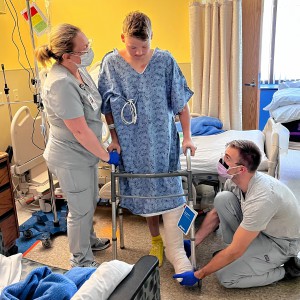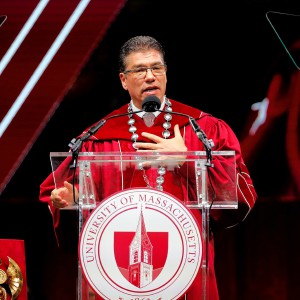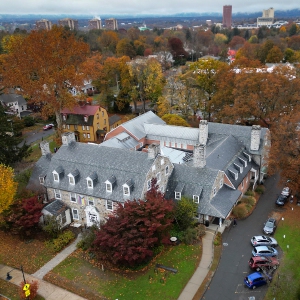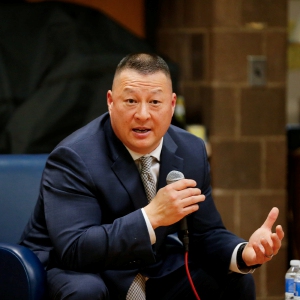Amherst Police staffing woes hit department morale
| Published: 01-02-2023 11:23 AM |
AMHERST — An already short-staffed Amherst police force, which recently had three members leave for lower-paying jobs at other area departments, means the remaining officers are working more overtime and having to prioritize emergency call responses.
With a department that has typically functioned with 48 officers now down to 38 officers, Police Chief Scott Livingstone said he worries that if municipal leaders don’t soon do more to stand up for the department, Amherst will be moving toward an outcome no one wants.
“The most dangerous thing for a community is a police department that doesn’t care,” Livingstone said.
Livingstone’s concerns prompted a recent invitation to members of the Town Council to come to informal meetings with officers, who got a chance to express what they feel has been a lack of support from the town, in part stemming from the controversial interaction between police officers and teens early on July 5. The town’s Diversity, Equity and Inclusion director determined that police didn’t abuse their authority during that response, even though some town committees, along with local advocates, have made that contention.
“Officers are upset about how they’ve been treated in the community, especially about one incident,” Livingstone said.
Police across the country have been a focus of defunding initiatives following the murder of George Floyd in 2020, including in Amherst. The concerns about Amherst policing increased following the post-midnight response over the summer which, with cellphone footage, showed an officer telling youths they have no rights — a small portion of an hourlong interaction that Livingstone has noted led to no arrests or citations, and all youths making it safely back to their homes.
“It’s been unwanted criticism for an incident that we feel was handled properly,” Livingstone said. “A lot of things have been said and written that were not true.”
Because of that incident, and its fallout, some officers have decided to leave, even for comparable police positions that don’t pay as much, but in places where they feel more valued by town residents. “They’re seeing what’s been said and written about them, and it’s affecting them,” Livingstone said.
Article continues after...
Yesterday's Most Read Articles
 Political newcomer defeats Shores Ness for Deerfield Selectboard seat
Political newcomer defeats Shores Ness for Deerfield Selectboard seat
 Granby Bow and Gun Club says stray bullets that hit homes in Belchertown did not come from its range
Granby Bow and Gun Club says stray bullets that hit homes in Belchertown did not come from its range
 Annette Pfannebecker: Vote yes for Shores Ness and for Deerfield
Annette Pfannebecker: Vote yes for Shores Ness and for Deerfield
 Susan Tracy: Support Ukraine funding
Susan Tracy: Support Ukraine funding
 Around Amherst: Bockelman joins in launch of governor’s housing push
Around Amherst: Bockelman joins in launch of governor’s housing push
 Defying the odds: Hadley’s Owen Earle back competing less than two years removed from horrific accident
Defying the odds: Hadley’s Owen Earle back competing less than two years removed from horrific accident
Staffing has already been trimmed in town, in part as a way to meet recommendations from the former Community Safety Working Group to create the unarmed police alternative Community Responders for Equity, Safety and Service.
The Police Department is budgeted for 46 officers, down two from a year ago due to a budget cut implemented by the Town Council. The roster includes the chief and two captains, Gabriel Ting and Ronald Young.
Ting said a challenge in getting new officers is that there is a sense they may come under attack for being part of the profession in Amherst.
“That’s becoming more and more frequent, especially in an almost anti-police climate in town,” Ting said.
So far, being down to just 38 officers hasn’t had negative consequences as far as what residents are seeing, as officers have been able to keep the peace in neighborhoods that might be affected by college student behavior while maintaining patrols in other hot spots.
“We’ve still been able to respond where we need,” Livingstone said.
But Livingstone said it’s difficult to have the minimum three officers working around the clock, which is having an effect on officers not being able to take time off to be with their families, and who may have to work holidays and other times.
“It’s having an adverse affect on the officers who are here,” Livingstone said.
Ting explained that because three cruisers are on the road at all times, if an officer calls out, he has to offer overtime opportunities based on seniority. If that list gets exhausted with no takers, then officers already working remain on for another eight-hour shift.
Livingstone said having fresh officers should be a priority. “What concerns me is mistakes get made when you’re on overtime,” Livingstone said
Town Manager Paul Bockelman said he is well aware of the problems confronting police.
“I think it’s been a different time for the Police Department and policing in general after the murder of George Floyd,” Bockelman said.
The concern over staffing came up at a recent Cuppa Joe event where residents could drop by the Bangs Community Center to meet with Bockelman and members of the Town Council.
In response to a question from a resident, Bockelman said he understands that some officers are leaving who otherwise might have spent their law enforcement careers in Amherst, and that recruitment has become more difficult with a diminished applicant pool.
In fact, Ting said the town is competing with other departments, like Northampton, to secure services of officers.
Bockelman said he understands the outcry over July 5 has not been good for feelings among officers. “That has been unfortunate, but I won’t say damaging,” Bockelman said.
Livingstone said the public should know that the department remains the most racially, ethnically diverse municipal department and that officers undergo extensive training in police protocols, as well as diversity and implicit bias. He has a standing offer to councilors to do ride-alongs so they can understand better what police encounter.
Though the department has made out OK, Livingstone said he worries about what could happen next spring if the call volume begins to get back toward pre-pandemic levels. So far, Bill Laramee, the community outreach officer, has been able to meet with off-campus students on a regular basis, especially after parties or other problems that require a police response.
There is some optimism ahead, as three officers will soon be on regular patrol after completing field officer training, and four are attending police academy. If there are no more departures before that training is complete, the department will get to 45 officers.
For fiscal year 2024, beginning next July, Livingstone said that he will ask for two additional officers to bring the force back to 48. This would allow him to schedule shifts that can overlap with others and would take some of the pressure off officers who have been forced to work back-to-back shifts.
Livingstone said the department has been historically understaffed and never been budgeted for what it needs. A comparable community that also has a state university, like Westfield, has between 58 and 62 officers.
Amherst’s force has adapted by having a regional mutual aid agreement that allows officers from the Pioneer Valley to supplement the town in busy times, particularly in response to some spring weekends when parties move outdoors, and the pre-St. Patrick’s Day revelry.
“We’re the only agency that’s ever used it,” Livingstone said.
That need could return this spring, with UMass graduation moved to late May and more warm weekends with students still in town.
Some in Amherst may be envisioning that CRESS can aid the police, though Livingstone said that is not a realistic expectation. Its teams of unarmed responders will be able to reduce the call volume to some extent, and Ting has trained them in activities such as situational awareness and report writing, but many calls, including domestic disturbances, will always require a police officer, Livingstone said.

 Sharing a few notes: High schoolers coaching younger string players one on one
Sharing a few notes: High schoolers coaching younger string players one on one Reyes takes helm of UMass flagship amid pro-Palestinian protests
Reyes takes helm of UMass flagship amid pro-Palestinian protests Sole over-budget bid could doom Jones Library expansion project
Sole over-budget bid could doom Jones Library expansion project Amherst poised to hire police department veteran as new chief
Amherst poised to hire police department veteran as new chief 